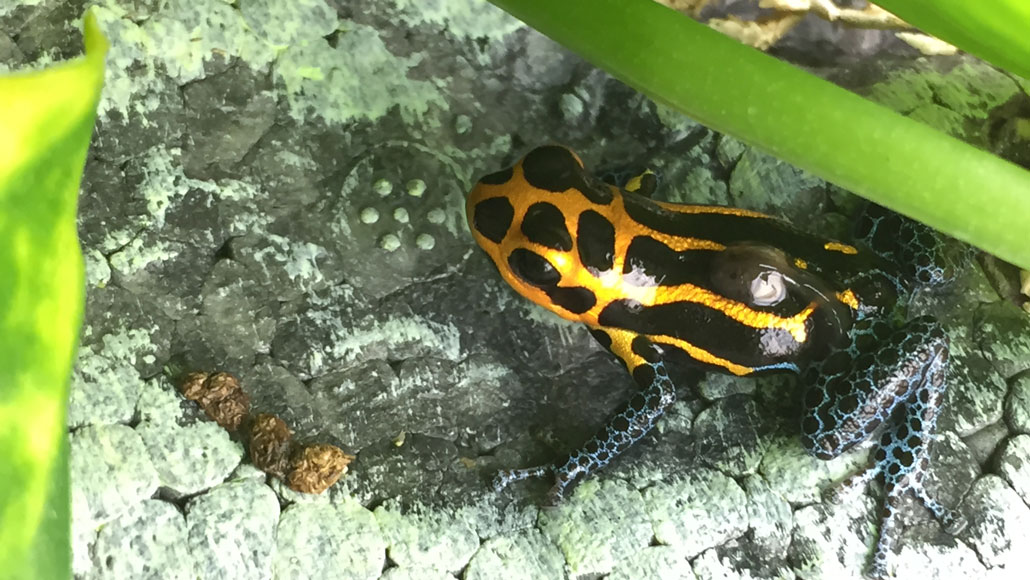A frog study may point to where parenting begins in the brain
Core regions include one active in mammals, hinting at an ancient basis for parental behaviors

PARENTAL FRAME OF MIND A R. imitator frog dad gives a tadpole a piggyback ride to water. Researchers have now linked two particular brain regions in frog parents to that care for their offspring.
E. Fischer
Most frogs lay oodles of eggs and quickly hop away. But some poison dart frogs baby their offspring, cleaning and hydrating eggs laid on land and piggybacking hatched tadpoles to water.
A peek inside the brains of these nurturing amphibians reveals that in males and females, two regions linked with caring for young are the same — a finding that may provide clues to the neural underpinnings of parental behavior, researchers report online July 17 in Proceedings of the Royal Society B.
From humans to crocodiles, many creatures tend to their young. “But we actually understand very little about how the brain makes parental behaviors,” says Eva Fischer, a neuroethologist at Stanford University.
To study how such care is wired into the amphibian brain, Fischer and her colleagues looked at neural activity in three poison dart frog species with different parenting strategies: Dendrobates tinctorius, among whom the males take care of the young; Oophaga sylvatica, whose females do the parenting; and Ranitomeya imitator, whose offspring are cared for by a monogamous male and female pair.
The researchers collected and quickly killed 25 frogs while the amphibians were toting their tadpoles to water, in order to study the brain while it was still influenced by the parental task. Another 59 brains from non-caregiving frog species or caregivers’ partners were also included in the study. The researchers froze the frog brains and sliced them like loaves of bread. They stained the layers of tissue to pinpoint which nerve cells, or neurons, were turned on.
In all three species, a brain region called the preoptic area was lit up with activity in caregiving frogs, but not in those of non-caregiving animals. The preoptic area is linked to parental behavior across vertebrates, including mammals. The overlap suggests an “extraordinary similarity and parallels between species that are … distant, evolutionarily,” says neurobiologist Catherine Dulac, a Howard Hughes Medical Institute investigator at Harvard University who was not involved with the work.
James Rilling, a biological anthropologist at Emory University in Atlanta who also was not part of the new research, is similarly intrigued. The finding “actually means these systems might be even more ancient than we thought,” he says.
The medial pallium, an amphibian version of mammals’ hippocampus that plays a role in memory, also buzzed with activity when parents of all three frog species carried their tadpoles. That brain region may be active because it helps the frogs create and use mental maps to move tadpoles to pools of water, the authors say.
Even though male and female caregiving frogs shared the two active brain regions, there were some differences in which neurons were active. For instance, the team looked at a particular neuron that Dulac’s group had previously found is tied to actions like grooming pups in mice. When focusing on this neuron’s activity, Fischer and her colleagues found associations with parental care in R. imitator, but not in parent frogs of the other two species.
While there might be a common core to parenting, it looks like evolution has injected some variation in the neural wiring for parenthood, Fischer says. Scientists still don’t understand what drives those patterns.
The researchers are developing tools to mess with the neural activity and see if they can turn parental behaviors on or off, Fischer says. Such a step could show just how parenting is wired into the animal brain.







